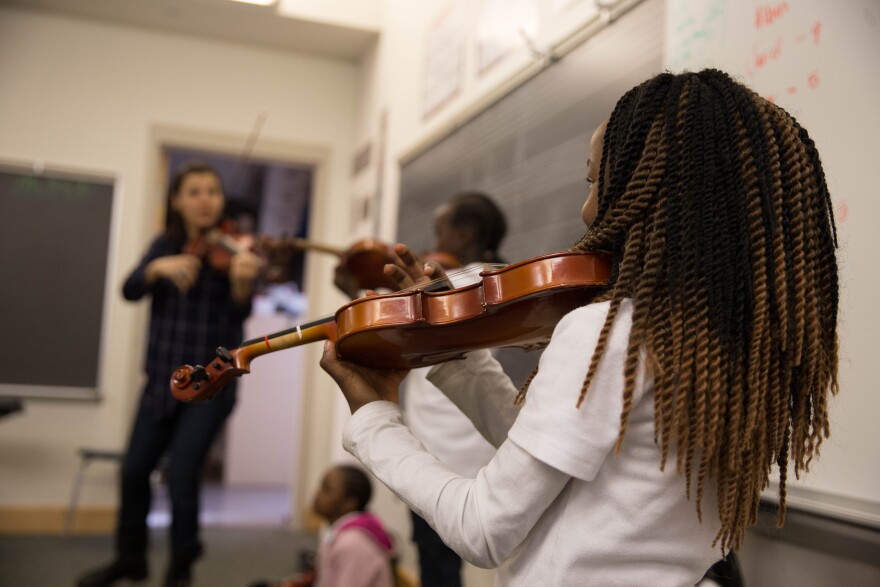Of the 530 refugees who arrived in the New Haven region last year, more than 270 were children. Many are nearing the end of their first year in a U.S. school. A local arts organization has partnered with the region’s resettlement agency to create a special afterschool violin program for the young refugees.
After the regular school day was over, the violin class was set to begin. A girl led her peers in "the helicopter game," where they practice how to place a violin bow on the string.
"Helicopter up," she said while gently bringing the bow down. "Landing," she said, and now it's time to start making music.
Students in the class range in age from 8 to 14 and all are refugees from Syria, Iraq, Afghanistan, and Somalia. Their teacher turned to a technique called pizzicato. As the children plucked the open strings on their instruments, she began to play a tune.
The teacher, Yaira Matyakubova, is a senior resident musician with Music Haven. The program provides free musical instruments, one-on-one lessons, group ensemble coaching, and trips to concerts -- all without charge -- to more than 75 low-income students in New Haven.
Matyakubova said the idea for this class began when Music Haven students learned that refugee families were being resettled in New Haven.
"When we heard about refugees fleeing from their homeland, going by foot, trying to escape the war zone, the conversation was brought up in our class and initially the kids are the ones who started the idea of wanting to meet the refugees and possibly play music for them," she said.
Noorham, 12, is from Iraq and has been in the United States for a year. "I like music and I like to play with the instruments," she said, before talking about her teacher. "I love her. She is smiling. Even [when] we are making mistakes, she is smiling!"
The program aims to help refugee children make new connections. It may also help them academically, psychologically, and socially.
"That deep engagement and liking for what they’re up to makes a real difference," said James Catterall, emeritus professor at UCLA and director of the Centers for Research on Creativity. "It’s a place for the children to emotionally and physically hang out and enjoy themselves and enjoy music, so that’s a start."
Music also benefits spatial reasoning, and that may help in learning a new language.
Back in class, teacher Matyakubova encouraged her students to sing. "We are learning music from, just simple tunes from Syria or Afghan melodies as well as 'Twinkle, Twinkle Little Star,'" she said.
"I like to play violin because you can learn more English and everything," said Ahmad, 14, who came to the United States from Syria.
Ahmad Alzouabi, his sister Nour, and their family recently arrived in New Haven. Nour said her brother practices his violin diligently.
"Every day I listen for him, because I think the music language, all the world understand this language," said Nour. "I like that my brother learns violin or learns anything about music."
The teacher, Matyakubova, was born in Uzbekistan and came to the U.S. at age 16 with a backpack and her violin. She said she understands the kinds of social challenges these young people face.
"When I first came here, I didn’t know the language and I didn’t know the culture and it took me some time to learn," said Matyakubova. "I find that through music – it brings us together, and we can embrace and rely on that in the times when its more difficult."
Matyakubova said she hopes the classes will help to instill in these young refugees a love of music, a feeling of belonging, and a greater sense of confidence about their place in the world.





